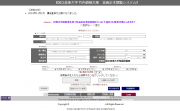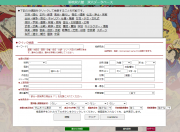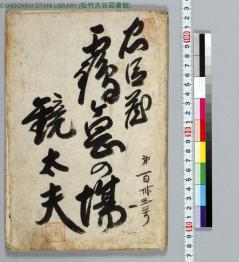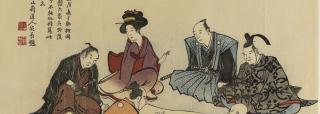-
[イベント情報]November 6, 2024(Wed)
Background:
Kazuko Kameda-Madar completed her PhD in Japanese Art History at the University of British Columbia in 2011. She has taught at the University of Hawaiʻi at Mānoa, University of Hawaiʻi - West Oʻahu, and Hawaiʻi Pacific University for many years. Currently, she holds the position of Visiting Professor of Japanese Art History at the Hebrew University of Jerusalem in Israel (HUJI). She is also a Visiting Researcher at the Art Research Center, Ritsumeikan University. Her research interest is in Edo-period Japanese art and visual culture based on Chinese pictorial themes and episodes, especially visual representations of the Orchid Pavilion Gathering that took place in 4th century China.
Her publications include Imagery of the Orchid Pavilion Gathering (Leiden: Brill, 2022); "An Iconology of the Orchid Pavilion Gathering: Image, Text, and Communities in Tokugawa-Era Japan" in The Tokugawa World (London: Routledge, 2021); and "Copying and Theory in Edo Period Japan" in Theorizing Imitation in a Global Context (London: Association of Art Historians, 2014). She is a co-editor of an anthology Power of Utsushi: Matrix of Creation and Continuity (Kyoto: Shibunkaku Press, 2014), and Sino-Japan Code and the Representation of Nature: Art and Literature of Japan in the 16th and 17th centuries (Tokyo: Bensei Press, 2019).Dr. Kameda-Madar, thank you very much for your time today. What sparked your interest in becoming a researcher in Japanese art history?
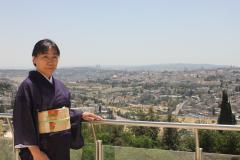
Kameda-Madar: Although I was always interested in art as a child in Japan, I took it more seriously when I began my formal education abroad - at the University of Hawaiʻi. Upon starting my studies, I realized how rich and wonderful Japanese art is, and I wanted to learn more about it. Prof. Mariko Inoue was my first mentor, greatly influencing my academic direction. I was fortunate to be surrounded by specialists in Chinese art. When I was seeking a topic for my MA thesis, Prof. James Cahill--who was in Hawaiʻi at that time--kindly introduced me to Prof. Hironobu Kohara in Kyoto. Under his guidance, I chose to study the theme of the Orchid Pavilion Gathering. This theme, which I believe embodies a strong, yet very subtle, implicit anti-war sentiment, captivated me, and I began to focus my research on the Sino-Japanese cultural relationship.
Read more>>[イベント情報]November 6, 2024(Wed)As part of the International ARC Seminar series, a special seminar will be held to mark the start of the 'FY 2024 Training Course to Decipher Japanese Cursive Script (Kuzushiji) with the ARC AI Transcription Support System.'
The program is as follows:
Speaker: Ellis TINIOS (Honorary Lecturer, University of Leeds, United Kingdom and ARC Visiting Collaborative Researcher)
Topic: 'Understanding Edo period books as material objects and bibliographic entities'
This seminar will be held in English.
Date: Wednesday, November 6, 18:00 - 19:30 JST
Participation: online via Zoom, free of charge (affiliated parties only, no reservation required)
*This webinar is open to everyone, and non-ARC members are invited to participate via YouTube.
[イベント情報]November 5, 2024(Tue)Kiyomoto-bushi is a style of narrative music traditionally performed as accompaniment for Kabuki theater. Alongside Tokiwazu- and Tomimoto-bushi, it belongs to the Bungo-bushi lineage of joruri narrative music and emerged out of Tomimoto-bushi as an independent style unto itself in the Bunka period (1804-1818). Known for its lighthearted and sophisticated storytelling, Kiyomoto-bushi has gained widespread popularity and includes numerous iconic pieces for Kabuki dance.
In addition to Kiyomoto-bushi Shohon, the collection also includes Shohon for Nagauta, Gidayu-bushi, and Tomimoto-bushi, making a total of 8,455 lyric booklets (Shohon) now available for viewing.
Kunitachi College of Music Library Takeuchi Dokei Collection--Japanese Lyric Booklets (Shohon) Viewing System:
https://www.dh-jac.net/db1/books/search_kunishohon.php?lang=jaARC Virtual Institute The World of the Takeuchi Dokei Collection:
https://www.arc.ritsumei.ac.jp/lib/vm/kunitake/[イベント情報]November 5, 2024(Tue)A database containing 650 Sugoroku items, representing about 500 different kinds of Sugoroku game boards, dating from the Edo period to the early 1950s collected by Osamu Yoshida, President of the Tsukiji Sugoroku Museum (https://sugoroku.net/), has been made available to the public.
Tsukiji Sugoroku Museum Database: https://www.dh-jac.net/db/nishikie/search_tkjSG.php
The Art Research Center (ARC) at Ritsumeikan University has digitally archived the materials using the ARC Database System.
The 650 items are divided into the following chronological groups: 41 from the Edo period, 167 from the Meiji period, 148 from the Taisho period, 221 from the Showa period, and 73 which are undated.
Sugoroku is a part of Japanese culture and reflects the manners, customs, and values of the times. The dreams, longings, and hopes of different eras are beautifully expressed in the final, winning space, conveying the spirit of common people of each period of time.
Sugoroku consists of many pictures, letters, and spaces, and this database is the only one in the world where you can view as many as 650 sheets of Sugoroku.
Our database contains bibliographic information and explanations carefully researched by President Yoshida, making it both fun to look at and informative to read.
Each Sugoroku game board is classified in detail by title, artist, publisher, etc., and is searchable by a number of thematic categorical terms as below.
Civilization/Enlightenment New Year/Seasonal Customs/Lifestyle Hygiene/Health Buddhism/Pure Land/Religion
Promotion/Competition/Official rank/Career/Work/Occupation Women/Girls/Women's ceremony
Lessons/Learning/Right and Wrong/Education/Enlightenment Advertising/Unveiling/Public Relations
Warriors/Valor/Battle/War/History Fairy tales/Nursery songs Monsters Characters/Comics
Entertainment/ humorous Music/Entertainment Kabuki/Plays/Actors Chushingura(Story of a loyal subject) Sports
Famous Places/Roads/Sightseeing Adventure/Space
[イベント情報]November 2, 2024(Sat)The Ritsumeikan University Saturday Seminar Series will be planned by the Art Research Center (ARC), Ritsumeikan University, in the month of November 2024.
3415th Session (Planning: Art Research Center, Ritsumeikan University)
Date: November 2 (Sat), 2024, 10:00-11:30 JST
Venue: Suekawa Memorial Hall, Kinugasa Campus, Ritsumeikan University, Kyoto (online streaming available via ZOOM)Topic: VR・メタバースによる現実空間の3D保存と教育利用 (held in Japanese)
Speaker: Hiroyuki YAMAUCHI (Associate Research Professor, Kinugasa Research Organization, Ritsumeikan University)
Participation is free of charge. Advance registration is required.
>>Register here.Abstract:
近年、ヘッドマウントディスプレイで体験するVirtual Reality(VR)のコンテンツが社会に普及しつつある。これに、写真測量などで取得した三次元地理情報を組み合わせれば、仮想空間に現実空間を再現でき、実際にその場にいるような雰囲気で散策しながら対象物を観察する擬似体験ができる。さらに、オンラインのメタバースプラットフォームを活用すれば、自作の仮想空間に他者を招いて交流できる。このような特徴から、様々な分野でこの種のVRの教育利用が期待されている。なかでも、実際の場所や事象を対象とする地理教育での有用性は高い。ヘッドマウントディスプレイで体験するVRの地理教材があれば、地理学が伝統的に重視してきた現地での「地理的な見方・考え方」の教育を、距離、費用、社会的制約を超えて教室内で再現できる。さらに仮想空間の特性を活かせば、事象の観察時に崖から飛び降りたり、空を飛んだりするような現実では不可能な自由度の高い学習行動も可能となる。本講演では、自然環境、地誌、災害、文化資源などを実際にVR教材にした事例や、それを用いた教育の実践例と効果について紹介する。
>>Website of the Ritsumeikan University Saturday Seminar Series
[イベント情報]October 23, 2024(Wed)Co-hosted with the College of Letters, Ritsumeikan University, the 139th International ARC Seminar will be held as a webinar on Wednesday, October 23, from 18:00 JST.
The program is as follows:
Speaker: Her Imperial Highness Princess Akiko of Mikasa (Professor, Institute of Japanese Culture, Kyoto Sangyo University; Visiting Professor, Ritsumeikan University)
Topic: 王室と皇室のものがたり―日英交流の軌跡-(A Tale of the Royal and Imperial Households: The Trajectory of UK-Japan Relations)
Date: Wednesday, October 23, 18:00 - 19:30 JST
Participation: Those concerned will be informed separately by e-mail.
文化資源の2D、3Dデジタルアーカイブとデジタル資料の管理・可視化に関するワークショップを開催いたします。本ワークショップでは、3日間かけて、文献・古典籍のような資料の撮影手法、データベースの登録と管理手法、写真測量による3Dモデルの作成手法、360度画像の取得・展示手法、GISを用いた地図作成手法などについて、演習形式で解説します。
日程・内容
本ワークショップは、11/22-24の3日間の日程で、次の内容・スケジュールで行います。
11/22(金)
13:00〜17:00 「文献・古典籍の撮影」
11/23(土)
9:00〜12:00 「ARCデータベース機能を用いたデジタルアーカイブ①」
13:00〜17:00 「ARCデータベース機能を用いたデジタルアーカイブ②」
11/24(日)
9:00〜10:30 「写真測量などを用いた3Dモデルの作成とデータの編集・可視化」
10:30〜12:00 「360度カメラによる全天球画像の撮影とバーチャル展示」
13:00〜15:30 「ArcGIS onlineと景観写真を活用したWeb地図の作成」
15:30〜16:00 「情報共有・意見交換」
講師:赤間 亮(文学部・教授)、山内啓之(衣笠総合研究機構・准教授)、堀池理生(衣笠総合研究機構・研究員)、平野理紗子(文学研究科・博士課程)、戸塚史織(文学研究科・博士課程)
対象者:日本文化資源デジタル・アーカイブ国際共同研究拠点(ARC-iJAC)または、「日本文化デジタル・ヒューマニティーズ拠点」プロジェクトにて活動する研究代表者および研究分担者
対面参加:10名(定員)
オンライン参加:定員なし ※演習の様子をZoomにて中継しますが、当日は会場の進行・補助が優先されることをあらかじめご理解のうえ、ご参加ください。
会場:立命館大学アートリサーチセンター 3F
アクセス:https://www.arc.ritsumei.ac.jp/j/aboutus/access.html言語:日本語
持ち物:PC(Windowsが望ましい)を持参してください
主催:立命館大学アート・リサーチセンター 文部科学省 国際共同利用・共同研究拠点「日本文化資 源デジタル・アーカイブ国際共同研究拠点」(ARC-iJAC)
参加希望者は、→ グーグルフォームから参加登録を行なってください。申し込み期限は、2024年11月8日です(対面は定員に達し次第、募集を終了します)。
本ワークショップに関するお問い合わせは、ml-tech-support (at) ml.ritsumei.ac.jp (at を @に変えてください) までお願いいたします。
[イベント情報]October 18, 2024(Fri)As part of the FY 2024 ARC-iJAC project 演劇上演記録データベースを活用した、演劇資料画像検索閲覧システムの構築に関る研究 (A Study on the Construction of a Search and Browsing System for Theater Photo Materials using a Database of Theater Performance Records), as of Oct. 18, 2024, the Shochiku Otani Library has released a digital archive of Takemoto yukahon theatrical chanters' books.
Yukahon are theatrical libretto books from which Takemoto gidayu chanters, seated on stage, read and chant. They are used in gidayu kyogen and some other categories of Kabuki plays. In addition to the text to be chanted and markings for the melody, the text also includes notations indicating actors' words or actions that serve as chanters' cues, as well as notation and direction for shamisen players.
The Shochiku Otani Library holds yukahon used by Kabuki chanters from the pre-war through post-war periods, including ones used by chanters Takemoto Kagamidayu I and Toyotake Kotobukidayu I.
Takemoto performers who perform at the Kabuki-za and other theatres still refer to these materials today.
Online public access to the Shochiku Otani Library's Collection of Valuable Materials "Theater Photos Search and Browsing System" is provided by the Art Research Center (ARC), Ritsumeikan University based on an agreement with the Shochiku Otani Library.
The digital archive includes 590 yukahon books, which can be viewed online in their entirety (the copyright period has not yet expired for 48 items in the collection; the images for these are not being made public).
We hope that the preservation of the original yukahon manuscripts through digitization and publicly available online database for these materials will be beneficial not only for the needs of active Takemoto performers, but for Kabuki researchers, enthusiasts, and future generations of performers as well.
You can read the Shochiku Otani Library's official press release (in Japanese) → here.
[イベント情報]October 2, 2024(Wed)The 138th International ARC Seminar will be held as a webinar on Wednesday, October 2, from 18:00 JST.
The program is as follows:
Speaker: Lani ALDEN (PhD candidate, Japanese Studies, University of California, Berkeley)
Topic: New Approaches to Digital Humanities: Large-Language Models and Large-Scale Tokenized Personal/Public Databases of Primarily Japanese Sources
Date: Wednesday, October 2, 18:00 - 19:30 JST
Participation: online via Zoom, free of charge (affiliated parties only, no reservation required)
*This is a closed event and YouTube livestream is not available.
[イベント情報]September 27, 2024(Fri)On September 10 and 11, 2024, the British Museum and the International Joint Digital Archiving Center for Japanese Art and Culture (ARC-iJAC), Art Research Center, Ritsumeikan University, hosted a symposium at SOAS University of London as part of the 3-year international joint research project 'Creative Collaborations: Salons and Networks in Kyoto and Osaka 1780-1880 (上方文化サロン:人的ネットワークから解き明かす文化創造空間 1780-1880),' supported by UK Research & Innovation (UKRI) and the Japan Society for the Promotion of Science (JSPS).
The research project, led by the Principal Investigators (PI) Prof. Ryo Akama (Director of the ARC/College of Letters, Ritsumeikan University) and Dr. Akiko Yano (Curator, Department of Asia, British Museum), aims to investigate the cultural and social impact of art and literary salons and the collective creation of art (gassaku) in early modern Japan, particularly in the Kyoto-Osaka region circa 1780-1880 by analysing over 5,000 objects in collections at the British Museum and in Japan.
During the course of this project, these works have been digitally archived and their textual inscriptions transcribed into an extensive online research database--the 'Kamigata Bunkajin Sogo Database' (「上方文化人総合データベース」)--established and operated by the ARC, providing a new portal for research on early modern Japanese culture with the possibility of incorporating other collections on different themes in the future.
<ARC Virtual Institute: Salons and Networks in Kyoto and Osaka>
The symposium was held in Japanese and English, and open to the public.
The book of abstracts of all the speakers' presentations is available for download →here.
Program
Presentations marked with (※) were held in Japanese.Day 1: September 10, 2024 9:00-9:10 Greetings
Akiko Yano (British Museum)9:10-11:00 Session 1: Poetry (haiku) circles and artists Speaker 1
Scott Johnson (Professor Emeritus, Kansai University): Notes on "A Haiku Journey to Osaka"Speaker 2
Yokoya Ken'ichiro (Otsu City Museum of History): 中嶋来章と俳諧摺物―義仲寺をめぐる絵師と俳壇 (※)Speaker 3
Ida Taro (Professor, Kindai University):『花月帖』から見える東西のサロンの交流 (※)Speaker 4
Sugimoto Yoshihisa (Professor, Tohoku University): 渡辺南岳と中村芳中の江戸行―俳諧と絵画の交流 (※)Discussant: Alfred Haft (British Museum) 11:05-12:55 Session 2: Osaka, a centre of literati culture Speaker 1
Nakatani Nobuo (Professor Emeritus, Kansai University; online): Kimura Kenkadō and his fellow artistsSpeaker 2
Tsukuda Ikki (Issa-an tea master; online): 煎茶サロンの仕掛け・語らいを生む絵画 (※)Speaker 3
Paul Berry (Professor Emeritus, Kansai University of Foreign Studies): Nature of literati world in OsakaSpeaker 4
Akeo Keizo (Professor, Osaka University of Commerce): 文化サロンとしての蔵屋敷 (※)Discussant: Andrew Gerstle (Professor Emeritus, SOAS University of London) 13:00-14:00 Break 14:00-14:50 Session 3: Independent paper Akama Ryō (Professor, Ritsumeikan University): 幕末明治の京都・大阪における文化サロン人物ネットワークのデータアーカイブと分析システム (※)
Commentator: Matsuba Ryoko (Sainsbury Institute for the Study of Japanese Arts and Cultures)14:50-15:10 Break 15:10-17:00 Session 4: Literary and artistic circles: publications, popularisation and commercial aspects Speaker 1
Xiangming Chen (PhD student, University of Oxford): Guide to literati: Kenkadō, Osaka publishing and reception of Qing artSpeaker 2 John Carpenter (Metropolitan Museum of Art): Collaborative paintings with poetry inscriptions as records of Kyoto salon culture Speaker 3 Yamamoto Yoshitaka (National Institute of Japanese Literature (NIJL)): Court nobles among renowned masters and friends: The imperial court and albums of calligraphy and painting in the early 19th-century Kyoto-Osaka region Speaker 4 Jingyi Li (Assistant Professor, Occidental College in Los Angeles; online): Commercialized gatherings and commodified literati in 19th-century shogakai Discussant: Ellis Tinios (Professor Emeritus, University of Leeds) Day 2: September 11, 2024 9:30-11:20 Session 5: Connections and networks via art Speaker 1
Iwasa Shin'ichi (Osaka Museum of History): 江戸時代後期の京坂と近隣地域における合作書画の諸相について-制作背景と揮毫者を中心に-(※)Speaker 2
Yamamoto Yukari (Wako University): 春画とサロン―長崎来舶清人との関係を中心に (※)Speaker 3 Hirai Yoshinobu (The National Museum of Modern Art (MOMAK)): 京・大坂における長崎派風の伝播の諸相 (※) Speaker 4 Timothy Clark (Honorary Research Fellow, British Museum): Maruyama-Shijō art at the British Museum Discussant: Rosina Buckland (British Museum) 11:20-12:00 General discussion
Symposium 'Creative Collaborations in Kyoto, Osaka and Beyond, 1770-1900'
Date: September 10, 9:00-17:00 & September 11, 9:30-12:00 (BST)
Venue: RG01, SOAS University of London
Organizer (UK): British Museum
Organizer (Japan): International Joint Digital Archiving Center for Japanese Art and Culture (ARC-iJAC), Art Research Center, Ritsumeikan UniversityHeader image credit: Tanida Sukenaga (artist, 1748-1825) and six haiku poets, Six poets (imitating the theme of 'Six Immortal Poets'). Surimono, colour woodblock print, 1808. British Museum, 1987,0729,0.2.


